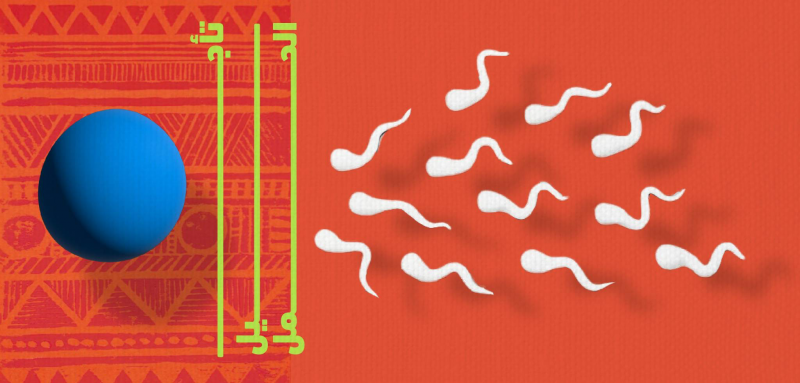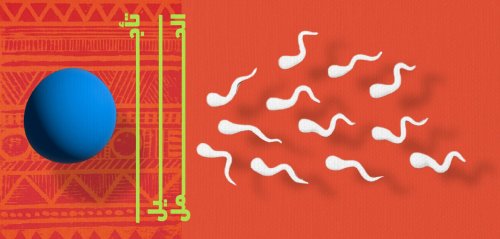
This report comes as part of the "Not on the Margins" project, which sheds light on freedoms, and sexual and reproductive health and rights in Lebanon
They deprived me of the feeling of motherhood". With these words, Manal, 28, summed up her suffering in a country that robbed her of all her rights, and did not stop at depriving her of the right to feel the purest and warmest experience that women can go through.
Manal is like many Lebanese women whose lives have been affected by the stifling economic and financial crisis in the country, on top of many others, that their right to have children has fallen from the index of basic human rights and has become a form of risk and recklessness.
"No children before life returns to normal"
Seven months have passed since Manal (pseudonym) got married, and she had, from the beginning, reluctantly made up her mind, "There will be no children before life returns to normal", and her husband agrees with her, since securing a decent life for children in Lebanon has become very difficult.
Regarding the decision not to have children, Manal tells Raseef22, "I would rather stay childless than have a child whom I'd be unable to provide with the most basic rights, even though I always dreamed of becoming a mother, holding my child in my arms and showering him with tenderness."
Manal pauses, takes a deep breath, and says, "I was raised in an orphanage, and I will not allow myself to have a child and let him live the way I had..."
Manal pauses, takes a deep breath, and says, "I was raised in an orphanage, and I will not allow myself to have a child and let him live the way I had. I've recently heard of a story where a mother had left her son in front of a children's home with a note saying she is unable to keep him with her under such difficult economic conditions." Manal then ends with a note of deep anguish and blame, saying, "May God never forgive them, they've deprived me of the feeling of motherhood."
Abortion in Lebanon is a legal offence, with women who resort to it facing a prison sentence between six months and three years
For her part, Mirna, 35, a mother of two, relayed that her daughter always tells her, "Mama, I want a sister," and she responds by saying, "Hopefully soon if God wills it," while knowing deep in her heart that doing this has become almost impossible.
Mirna tells Raseef22, "My husband works as a public sector employee where he receives a salary in Lebanese pounds and we can barely make ends meet, between the costs of food, schools, and some basic needs, so how will we be able to have a child who now needs a full salary for him alone in Lebanon, from vaccines to milk and diapers, in addition to the fact that many necessities are no longer available and can only be found on the black market at insane prices?"
A significant decrease in the birth rate
Speaking to Raseef22, Dr. Honaida Obeid, a specialist in obstetrics and gynecology, indicates that the number of women who have given birth recently has decreased significantly compared to previous years. She points out that we are facing a new phenomenon today, which is one where newlyweds are postponing being parents, while this was not a prevalent matter in the past.
In the same context, the coordinator of the Demography Laboratory at the Research Center within the Institute of Social Sciences (ISS) at the Lebanese University, Dr. Chawki Attieh, says that the birth rate in Lebanon has witnessed a downward trajectory in the last two years (2020-2021), according to data from the Central Administration of Statistics.
Dr. Honaida Obeid indicates that the number of women who have given birth recently has decreased significantly compared to previous years, pointing out that we are facing a new phenomenon today, which is one where newlyweds are postponing being parents
Attieh explained that this apparent decline has several reasons, foremost of which is the bad economic situation that pushes couples to postpone or cancel childbearing altogether, in addition to their concern about the possibility of providing the necessary materials needed for women's medical care or children's supplies in Lebanon. "This does not mean that the economic factor is the only reason that led to the decline in births, but also due to an increasing level of awareness in Lebanon, which pushes married couples to think well and hard before deciding to have children, given the country's instability as it further drowns in the unknown," says Attieh, who then, as an example, cites the anxiety that the Lebanese people experienced this summer about whether war will break out in September, or the fear of many security crises that may occur in the near future.
He also drew attention to the phenomena of the major decline in marriage and the high rate of divorce in recent years, which can be considered as major factors in the decline in the number of births.
A significant demand for abortion
Ahmed, the owner of a pharmacy in Beirut, reveals to Raseef22 that the demand for contraceptives has increased compared to previous years, but what seemed even more remarkable in the last two years was the high demand of women for abortion pills without a doctor's prescription, attributing the reason to the economic situation and fear of the unknown.
He goes on to say, "Even though the prices of medicines are rising significantly amid the continuous collapse of the exchange rate of the Lebanese pound against the dollar, the demand for contraceptive and pregnancy-termination drugs has not seen any decline."
Although contraceptives are licensed by the Lebanese Ministry of Health, obtaining a prescription is necessary to justify the purchase.
Hence, some pharmacists are left undecided when faced by a problem that leads to human suffering in these difficult economic conditions on the one hand, and an unsafe abortion that may endanger women's lives on the other.
In a groundbreaking report entitled, “Seeing the Unseen. The case for action in the neglected crisis of unintended pregnancy”, the United Nations Population Fund (UNFPA) reported that there are legal restrictions continue to place barriers to access to safe abortion, which have limited the impact on restricting the practice and even increase the incidence and mortality of unsafe abortions.
The report notes that unsafe abortion causes 7 million women to be hospitalized each year in developing countries, resulting in an estimated 193,000 maternal deaths between 2003 and 2009.
Perhaps it was not foreseen that the calamities in Lebanon would even extend to the "wombs" of women in the country, robbing them and forcing them to postpone motherhood for the time being...
In this context, Dr. Honaida Obeid states that there has been a significant increase in requests for contraceptive methods in medical clinics as well, especially the IUD , and notes that she witnessed a greater boldness when it came to asking for abortion than was the case previously.
Abortion in Lebanon is a legal offence, with women who resort to it facing between six months and three years in prison. This includes women who take medication with the intention of aborting their pregnancies without any justification, while those who perform an abortion on a woman with her consent face a sentence of between one and three years in prison.
Dr. Honaida Obeid states there has been a significant increase in requests for contraceptive methods in medical clinics, especially the IUD , and notes that she witnessed a greater boldness when it came to asking for abortion than was the case previously
What more?
Dr. Chawki Attieh explains that if the situation in Lebanon stabilizes in the coming years and witnesses better conditions in terms of the availability of necessities for children, such as milk, diapers, medicines, and other medical necessities that must be present, it is possible we will witness what is called a "compensation" of sorts, that is, a sudden increase in births for a year or two if the couples had only postponed childbearing. But if we do not witness a significant increase, then the situation will indicate that most of them have taken the decision to cancel childbearing altogether.
Attieh expressed his fear that Lebanon will remain at the same level in terms of the birth rate, especially since Lebanon today is the most long-lived country in the Arab world, with the percentage of the elderly over the age of 65 reaching approximately 13%. This percentage will likely increase as a result of the sharp decline in births, in addition to the increase in emigration, which will thus generate a great burden on the younger people to support the elderly.
Perhaps it was not foreseen that the calamities in Lebanon would even extend to the "wombs" of women in the country, robbing them of their motherhood and forcing them to postpone having children for the time being… The question remains: When will we finally see a way out from the throes of all these crises?
Raseef22 is a not for profit entity. Our focus is on quality journalism. Every contribution to the NasRaseef membership goes directly towards journalism production. We stand independent, not accepting corporate sponsorships, sponsored content or political funding.
Support our mission to keep Raseef22 available to all readers by clicking here!
Interested in writing with us? Check our pitch process here!







